Sleepless Nation
By Dr. Mehmet Oz
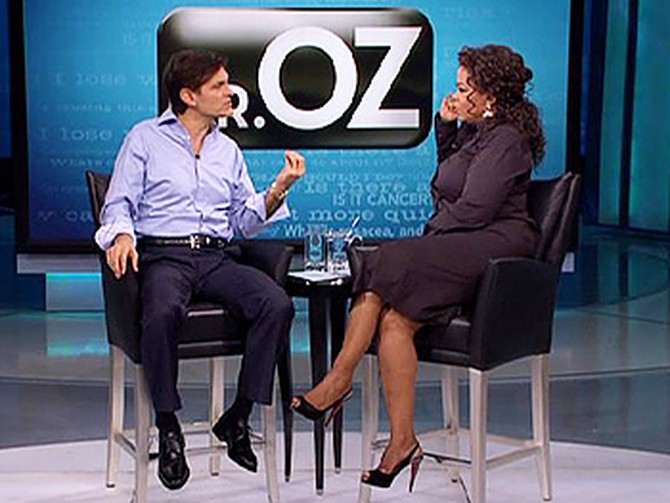
An estimated 70 million Americans suffer from sleep disorders, ranging from common insomnia to the truly unusual—sleepwalking, night terrors, sleepeating and even sleepsex. In some rare cases, people have been observed smoking cigarettes…and even getting in their cars and driving for miles while asleep.
"Sleep is one of those spiritual processes," Dr. Oz says. "We let our base instincts shine through." Normally those instincts only show up in our brains while we dream—not during the dreamless "deep sleep" when the brain should be restoring itself. Dr. Oz says the reason some people sleepwalk is because the part of their brains that inhibits their movement lets its guard down and allows unconscious desires to slip through.
"When you dream, normally you're paralyzed, you can't move around," Dr. Oz says. "But when you're in a deep restorative sleep, you're not paralyzed. So your brain—some part of it—slips out. Your legs start moving, [but] your brain doesn't know where you are. That cortex that gives you judgment and executive function isn't there."
"Sleep is one of those spiritual processes," Dr. Oz says. "We let our base instincts shine through." Normally those instincts only show up in our brains while we dream—not during the dreamless "deep sleep" when the brain should be restoring itself. Dr. Oz says the reason some people sleepwalk is because the part of their brains that inhibits their movement lets its guard down and allows unconscious desires to slip through.
"When you dream, normally you're paralyzed, you can't move around," Dr. Oz says. "But when you're in a deep restorative sleep, you're not paralyzed. So your brain—some part of it—slips out. Your legs start moving, [but] your brain doesn't know where you are. That cortex that gives you judgment and executive function isn't there."
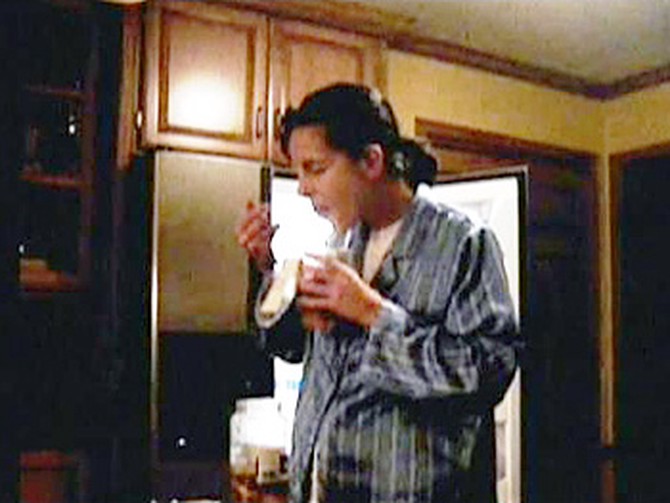
A camera set up by her husband catches Angela, a 33-year-old mother of two, in the act of sleepeating.
While sound asleep at 2 a.m., Angela starts by stuffing olives into her mouth. Then she moves on to leftover pasta salad, eating it right from the container. She ends this "meal" with cold macaroni and cheese before shuffling back to bed…completely unaware that she just ate nearly 1,000 calories!
Angela says she eats in her sleep almost every night. "Sleepeating makes me feel like a bad person," she says. "It makes me feel very guilty. I'm ashamed."
Dr. Oz says sleepeating is an overwhelmingly female problem. Men are more prone to act on their unconscious desires with sleepsex, he says.
While sound asleep at 2 a.m., Angela starts by stuffing olives into her mouth. Then she moves on to leftover pasta salad, eating it right from the container. She ends this "meal" with cold macaroni and cheese before shuffling back to bed…completely unaware that she just ate nearly 1,000 calories!
Angela says she eats in her sleep almost every night. "Sleepeating makes me feel like a bad person," she says. "It makes me feel very guilty. I'm ashamed."
Dr. Oz says sleepeating is an overwhelmingly female problem. Men are more prone to act on their unconscious desires with sleepsex, he says.

Like Angela, 44-year-old Sherri also eats in her sleep. She says she's been doing it for 13 years.
One night, Sherri starts her sleepeating at midnight, totally oblivious to her son, who is in the room videotaping. First she eats coleslaw and lunch meat, and guzzles milk right from its container. Later, she dunks bread heated in a microwave, sliced ham and crackers into dip.
Sherri says she only finds out about her sleepeating—which she says can pack on between 1,500 to 3,000 calories in a night—when she wakes up with stomachaches and sees the physical evidence of her gorging left around the kitchen. "There will be a spoon or crackers left out or dip. Something will be left," she says. "You're kind of on autopilot, so you don't remember at the time, but you have recollections of it in the morning."
One night, Sherri starts her sleepeating at midnight, totally oblivious to her son, who is in the room videotaping. First she eats coleslaw and lunch meat, and guzzles milk right from its container. Later, she dunks bread heated in a microwave, sliced ham and crackers into dip.
Sherri says she only finds out about her sleepeating—which she says can pack on between 1,500 to 3,000 calories in a night—when she wakes up with stomachaches and sees the physical evidence of her gorging left around the kitchen. "There will be a spoon or crackers left out or dip. Something will be left," she says. "You're kind of on autopilot, so you don't remember at the time, but you have recollections of it in the morning."
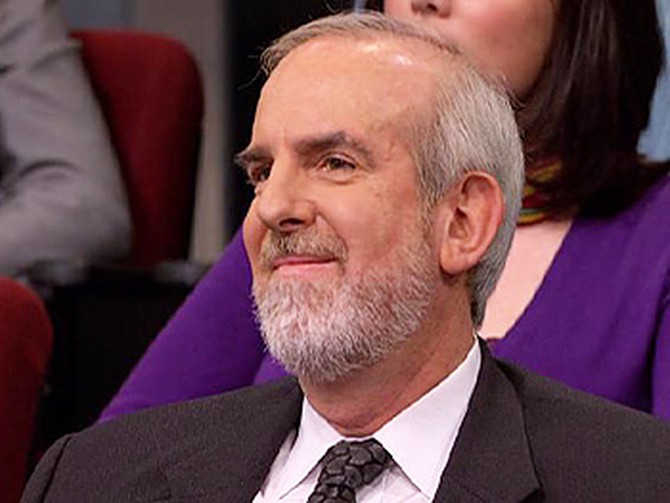
According to psychiatrist Dr. Carlos Schenck, a pioneer in the field of sleep disorders and author of Sleep: The Mysteries, the Problems, and the Solutions, sleepeating is an increasing problem.
There are several possible causes of sleepeating, he says, including America's rising obesity rates. "Many people with obesity develop sleep apnea, which is a known cause of sleepeating," Dr. Schenck says.
Obesity is not the only cause, though. "Many of the commonly prescribed sleeping pills for treating insomnia, which are usually safe and effective, can cause sleepeating in a small but significant percentage of people taking the medication," Dr. Schenck says.
The other possible causes for sleepeating are the same ones that make our society so generally sleep-deprived. "Shift work, traveling across time zones and living in a 24/7 high-stress world really disrupts our body rhythms," Dr. Schenck says.
Dr. Oz says one of the main reasons we don't sleep enough is that we don't place enough value in it. "Sleep is so precious," he says. "Nightfall used to make us tired and bring with us quiet and peacefulness and a time to get in touch with ourselves. That's all gone now. Now you're getting the last e-mail off."
There are several possible causes of sleepeating, he says, including America's rising obesity rates. "Many people with obesity develop sleep apnea, which is a known cause of sleepeating," Dr. Schenck says.
Obesity is not the only cause, though. "Many of the commonly prescribed sleeping pills for treating insomnia, which are usually safe and effective, can cause sleepeating in a small but significant percentage of people taking the medication," Dr. Schenck says.
The other possible causes for sleepeating are the same ones that make our society so generally sleep-deprived. "Shift work, traveling across time zones and living in a 24/7 high-stress world really disrupts our body rhythms," Dr. Schenck says.
Dr. Oz says one of the main reasons we don't sleep enough is that we don't place enough value in it. "Sleep is so precious," he says. "Nightfall used to make us tired and bring with us quiet and peacefulness and a time to get in touch with ourselves. That's all gone now. Now you're getting the last e-mail off."
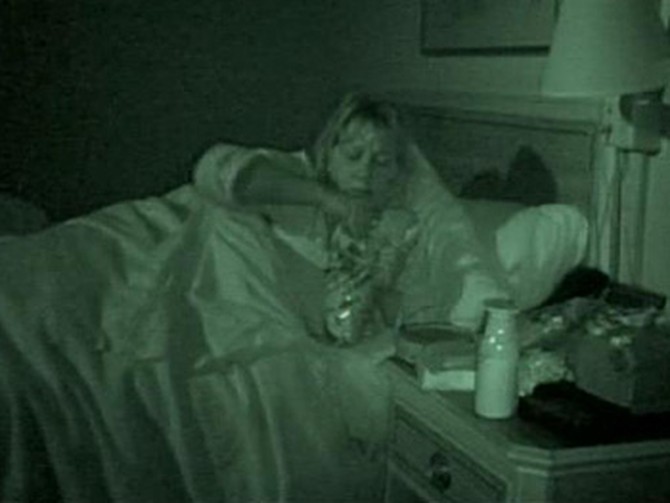
To further investigate the workings of their sleepeating, Sherri and Angela agree to undergo a study at Northwestern Memorial Hospital's Sleep Disorders Center.
While she was asleep, research cameras caught Sherri tucking into a midnight snack of milk and corn chips. She moved on to cheese and pepperoni at 12:30 a.m., and then downed mixed nuts at 4 a.m.
Dr. Schenck says Sherri's experiences in these three periods of sleepeating were common—in each, she left medium deep sleep and was not really conscious of her actions. "Sometimes, people have fragments of memories of what they did," he says. "Otherwise, they don't have any memories."
"These folks are not crazy," Dr. Oz says. "They do crazy things, but they're not crazy at all. The brain has lost that ability to control what's going on, so you start to act out in ways you normally wouldn't."
While she was asleep, research cameras caught Sherri tucking into a midnight snack of milk and corn chips. She moved on to cheese and pepperoni at 12:30 a.m., and then downed mixed nuts at 4 a.m.
Dr. Schenck says Sherri's experiences in these three periods of sleepeating were common—in each, she left medium deep sleep and was not really conscious of her actions. "Sometimes, people have fragments of memories of what they did," he says. "Otherwise, they don't have any memories."
"These folks are not crazy," Dr. Oz says. "They do crazy things, but they're not crazy at all. The brain has lost that ability to control what's going on, so you start to act out in ways you normally wouldn't."

While people who sleepeat are acting because their brain is having trouble controlling instincts during deep sleep, people who have "night terrors" act—sometimes quite violently—on what their brain thinks is happening. People suffering from night terrors typically flail around, hallucinate and scream.
Night terrors are not the same as nightmares. "There's a big difference," Dr. Oz says. "Nightmares happen when you're in the dream phase of sleep, when you're actually paralyzed so you can't move to respond to the nightmare and you actually usually recall it. … If you're in that deep hibernating sleep and you have one of these night terrors, your whole body responds. Your heart rate goes up. You start sweating. It's much more than just a bad dream."
Ashley says she has been having night terrors since she was a child. She set up a camera in her bedroom to document one of her regular night terrors and captured a video of her letting out a scream worthy of the scariest horror movie.
Does she remember what caused such a fright? "Not that particular dream, but it was most likely about bugs. About 95 percent of my dreams that I have that cause me to scream are about bugs—spiders, grasshoppers," Ashley says. "I don't like [bugs], but I don't have a phobia, per se. But in my dreams, I'm much more afraid of them. In my dreams, the bugs are also attacking me. They're much more aggressive in my dreams than they are in real life."
Night terrors are not the same as nightmares. "There's a big difference," Dr. Oz says. "Nightmares happen when you're in the dream phase of sleep, when you're actually paralyzed so you can't move to respond to the nightmare and you actually usually recall it. … If you're in that deep hibernating sleep and you have one of these night terrors, your whole body responds. Your heart rate goes up. You start sweating. It's much more than just a bad dream."
Ashley says she has been having night terrors since she was a child. She set up a camera in her bedroom to document one of her regular night terrors and captured a video of her letting out a scream worthy of the scariest horror movie.
Does she remember what caused such a fright? "Not that particular dream, but it was most likely about bugs. About 95 percent of my dreams that I have that cause me to scream are about bugs—spiders, grasshoppers," Ashley says. "I don't like [bugs], but I don't have a phobia, per se. But in my dreams, I'm much more afraid of them. In my dreams, the bugs are also attacking me. They're much more aggressive in my dreams than they are in real life."

Amy says she's also suffered with night terrors for most her life. "In my dreams, someone is always coming into my room—from the ceiling, from a door—to kill me, to come after my family," she says.
Since she was about 9 years old, she would feel panicked during the night terror and wake up sweating, shaking and with a racing heart. "It takes me a long time, sometimes, to come down from that and to realize it's not real," she says.
Once Amy fell asleep with her infant son, Wyatt, while he was nursing. Amy says about a half hour later, she started having a night terror about someone coming to get them both.
"I picked him up [like a football] and literally sprinted down our hallway to find my husband and his brother still up in the living room talking," she says. "He immediately grabbed Wyatt."
After this terrifying incident, Amy decided to seek professional help.
Since she was about 9 years old, she would feel panicked during the night terror and wake up sweating, shaking and with a racing heart. "It takes me a long time, sometimes, to come down from that and to realize it's not real," she says.
Once Amy fell asleep with her infant son, Wyatt, while he was nursing. Amy says about a half hour later, she started having a night terror about someone coming to get them both.
"I picked him up [like a football] and literally sprinted down our hallway to find my husband and his brother still up in the living room talking," she says. "He immediately grabbed Wyatt."
After this terrifying incident, Amy decided to seek professional help.
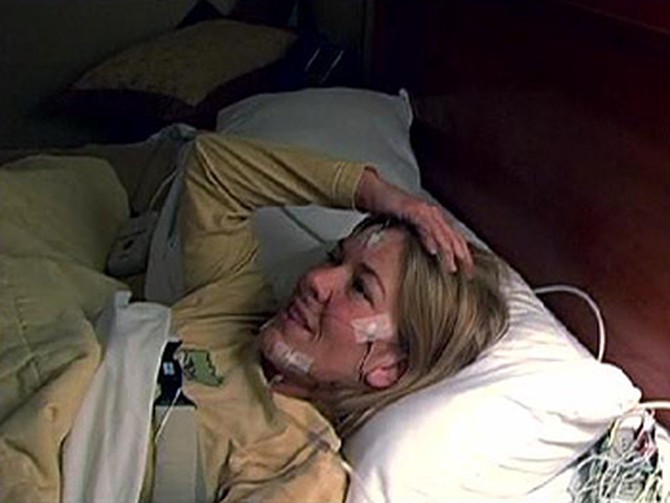
Ashley and Amy were also sent for sleep studies at Northwestern Memorial Hospital for their unstable sleep patterns. "For people who are really susceptible to night terrors, the unstable sleep leads to the brain pushing a panic button that results in the night terror event," Dr. Schenck says. "Some type of stimulus—it could be a dream, a little movement or some sound—then triggers the massive outflow of adrenalin that results in a night terror."
Ashley experienced two night terror episodes during her study—one just 30 minutes after going to bed—and fell back into a deep sleep after both. "Ashley actually had far too much deep sleep, and the deep sleep took place throughout most of the night," Dr. Schenck says. "Usually, deep sleep occurs at the beginning of the night when we need to restore ourselves. For Ashley, it occurred throughout almost all her sleep."
Dr. Schenck says there are safe and effective treatments to help women like Ashley and Amy. "For milder cases, the intervention usually involves getting enough sleep, being regular about when you sleep and reducing the stress in your life. You may need some counseling or learn yoga, meditation, hypnosis to help tone down your nervous system in preparation for sleep to really calm down," he says. "For more severe cases, there are very effective and safe medications people can take at bedtime that will do the job of preventing that hair-trigger response."
Can past-life regression help ease Amy's night terrors?
Ashley experienced two night terror episodes during her study—one just 30 minutes after going to bed—and fell back into a deep sleep after both. "Ashley actually had far too much deep sleep, and the deep sleep took place throughout most of the night," Dr. Schenck says. "Usually, deep sleep occurs at the beginning of the night when we need to restore ourselves. For Ashley, it occurred throughout almost all her sleep."
Dr. Schenck says there are safe and effective treatments to help women like Ashley and Amy. "For milder cases, the intervention usually involves getting enough sleep, being regular about when you sleep and reducing the stress in your life. You may need some counseling or learn yoga, meditation, hypnosis to help tone down your nervous system in preparation for sleep to really calm down," he says. "For more severe cases, there are very effective and safe medications people can take at bedtime that will do the job of preventing that hair-trigger response."
Can past-life regression help ease Amy's night terrors?

Do you have trouble getting to sleep? You're not alone—Dr. Oz says 60 percent of Americans suffer from insomnia. Kris, a working mother of three, says she is an extreme insomniac and often goes five days with little to no sleep.
Watch Kris's video diary of what she calls a typical night in hell.
Although Kris says her body is tired, it won't let her sleep. Eventually, she will give up and cook a meal, clean the house and even bake a cake. "It's really, really ridiculous that I can't get any sleep. My body just won't shut down once it hits the pillow. My physical body is exhausted," she says.
Dr. Oz says women often have more trouble sleeping than men do. "It's more women than men in part because of hormones and in part because of the way women deal with anxiety in their lives," Dr. Oz says.
That inability to fall asleep can lead to serious problems, Dr. Oz says. "Probably 100,000 motor vehicle accidents alone [occur] because of insomnia. They also increase heart attack rates, stroke rates. A lot of things are associated," Dr. Oz says.
Watch Kris's video diary of what she calls a typical night in hell.
Although Kris says her body is tired, it won't let her sleep. Eventually, she will give up and cook a meal, clean the house and even bake a cake. "It's really, really ridiculous that I can't get any sleep. My body just won't shut down once it hits the pillow. My physical body is exhausted," she says.
Dr. Oz says women often have more trouble sleeping than men do. "It's more women than men in part because of hormones and in part because of the way women deal with anxiety in their lives," Dr. Oz says.
That inability to fall asleep can lead to serious problems, Dr. Oz says. "Probably 100,000 motor vehicle accidents alone [occur] because of insomnia. They also increase heart attack rates, stroke rates. A lot of things are associated," Dr. Oz says.
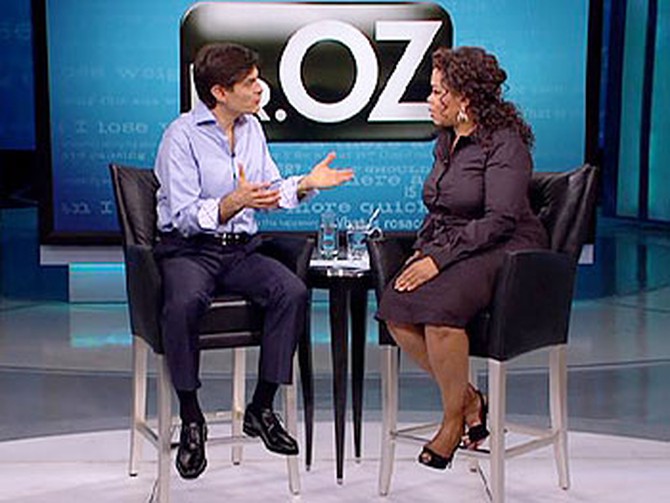
It is possible for insomniacs like Kris to catch up on their sleep, but Dr. Oz says they need to go about it in the right way. "What a lot of Americans do is they sleep deprive themselves during the week and try to make it up on the weekends. But what you've got to do is wake up the same time every day. Get into a routine and be able to do that for weeks and weeks on end," he says.
Dr. Oz recommends waking up at the same time every morning—regardless of when you fell asleep the night before. If you're still tired, go to sleep 15 minutes earlier the next night. "Slowly, over time, lengthen the period of time you're in sleep," Dr. Oz says.
Another solution comes down to simple sleep hygiene. "That's a matter of doing the same thing that used to happen to our ancestors a thousand years ago—dimming the lights in the home, making it dark, making it quiet, keeping it cool, wearing loose-fitting clothes," Dr. Oz says. Also, he suggests avoiding late-night exercise, alcohol and meals, and cutting out any caffeine after noon.
The average person should be able to fall asleep within 15 to 30 minutes of lying down, Dr. Oz says. If you can't sleep, get up! "Do something calming and soothing and meditative, and then try again in a few minutes," Dr. Oz says. If your thoughts keep you up, Dr. Oz suggests keeping pen and paper by the bed so you can write them down. "I think those kinds of little tricks that you adopt for yourself can deal with whatever your hitch is in getting to sleep."
Dr. Oz recommends waking up at the same time every morning—regardless of when you fell asleep the night before. If you're still tired, go to sleep 15 minutes earlier the next night. "Slowly, over time, lengthen the period of time you're in sleep," Dr. Oz says.
Another solution comes down to simple sleep hygiene. "That's a matter of doing the same thing that used to happen to our ancestors a thousand years ago—dimming the lights in the home, making it dark, making it quiet, keeping it cool, wearing loose-fitting clothes," Dr. Oz says. Also, he suggests avoiding late-night exercise, alcohol and meals, and cutting out any caffeine after noon.
The average person should be able to fall asleep within 15 to 30 minutes of lying down, Dr. Oz says. If you can't sleep, get up! "Do something calming and soothing and meditative, and then try again in a few minutes," Dr. Oz says. If your thoughts keep you up, Dr. Oz suggests keeping pen and paper by the bed so you can write them down. "I think those kinds of little tricks that you adopt for yourself can deal with whatever your hitch is in getting to sleep."
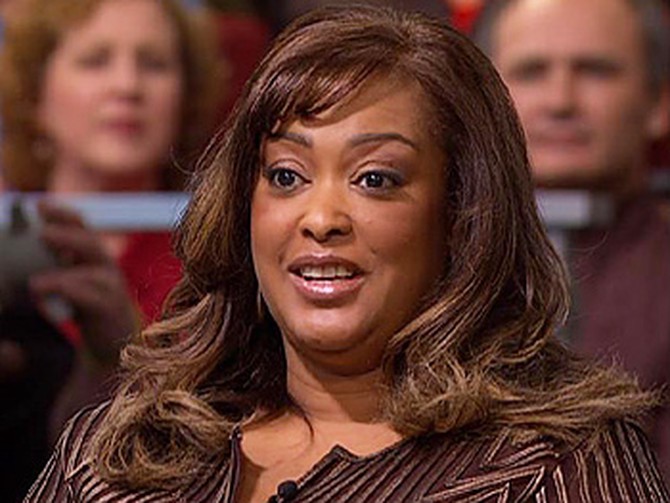
Are embarrassing health issues keeping you up at night? Dr. Oz answers questions from audience members to help put their minds at ease.
Michelle wants to know how to ease the pain of her anal fissures. "Kudos to you," Dr. Oz says. "You've come out and spoken about something that 75 percent of us have problems with [that causes pain] down there during our lifetimes."
Anal fissures are small tears in the tissue that lines the anus often caused by hard bowel movements, constipation or constant diarrhea. Anal fissures—often mistaken for hemorrhoids—can make going to the bathroom painful and may cause some bleeding. "The good news is at least for 90 percent of people you can treat it with extra water, fiber and doing things that avoid irritating it—for example, straining, [eating] really hot foods, spicy foods."
If the fissures don't get better in two to four weeks, Dr. Oz says patients might need to undergo a four-finger procedure to stretch the muscle or have Botox injected into the muscle.
"One of the things that people need to do is to soak in warm baths. That actually helps it a lot by relaxing that part of your bottom," he says. "What works really effectively [at work] is get a warm heating pad, and sit on it when you're at work. It will warm that area up. And you've got to keep it dry because if it's wet, those cracks don't heal."
Michelle wants to know how to ease the pain of her anal fissures. "Kudos to you," Dr. Oz says. "You've come out and spoken about something that 75 percent of us have problems with [that causes pain] down there during our lifetimes."
Anal fissures are small tears in the tissue that lines the anus often caused by hard bowel movements, constipation or constant diarrhea. Anal fissures—often mistaken for hemorrhoids—can make going to the bathroom painful and may cause some bleeding. "The good news is at least for 90 percent of people you can treat it with extra water, fiber and doing things that avoid irritating it—for example, straining, [eating] really hot foods, spicy foods."
If the fissures don't get better in two to four weeks, Dr. Oz says patients might need to undergo a four-finger procedure to stretch the muscle or have Botox injected into the muscle.
"One of the things that people need to do is to soak in warm baths. That actually helps it a lot by relaxing that part of your bottom," he says. "What works really effectively [at work] is get a warm heating pad, and sit on it when you're at work. It will warm that area up. And you've got to keep it dry because if it's wet, those cracks don't heal."
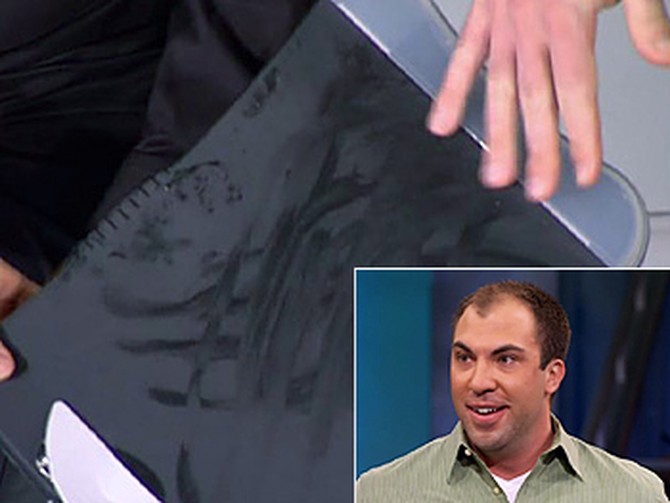
It's natural to have sweaty hands when you're nervous or excited, but what happens when you have them all the time? Oprah Show producer Brad says his palm sweat is excessive.
"Working here at the show, I get to meet a lot of people, a lot of guests that come to the show. I'm terrified to shake people's hands because my hands sweat all day long," he says. "They drip of sweat. They're always wet."
Dr. Oz says Brad has something called hyperhidrosis—excessively sweaty hands, palms and feet. "It's about 1 percent of Americans who complain about this, but in some cultures, Asian cultures, the numbers are 10, 20 times higher than that," Dr. Oz says. Hyperhidrosis is normally a harmless condition, Dr. Oz says, but it can sometimes be linked to thyroid issues and diabetes.
Dr. Oz recommends Brad cut out all caffeine and chocolate. "That's got to be gone," he says. "That turns the spout on." Brad can also look into medical grade antiperspirants for his hands, such as aluminum chloride. "There's a little water bath setup that you can put your hands in, and you put low dosage electricity through it. It actually helps your sweat glands dry up," Dr. Oz says. "Also, you can get Botox in the axilla [a gland near the armpit]."
Surgery is another option, but not one Dr. Oz feels is necessary for Brad. "The operation is called a sympathectomy," Dr. Oz says. "I personally wouldn't get an operation for sweaty hands."
"Working here at the show, I get to meet a lot of people, a lot of guests that come to the show. I'm terrified to shake people's hands because my hands sweat all day long," he says. "They drip of sweat. They're always wet."
Dr. Oz says Brad has something called hyperhidrosis—excessively sweaty hands, palms and feet. "It's about 1 percent of Americans who complain about this, but in some cultures, Asian cultures, the numbers are 10, 20 times higher than that," Dr. Oz says. Hyperhidrosis is normally a harmless condition, Dr. Oz says, but it can sometimes be linked to thyroid issues and diabetes.
Dr. Oz recommends Brad cut out all caffeine and chocolate. "That's got to be gone," he says. "That turns the spout on." Brad can also look into medical grade antiperspirants for his hands, such as aluminum chloride. "There's a little water bath setup that you can put your hands in, and you put low dosage electricity through it. It actually helps your sweat glands dry up," Dr. Oz says. "Also, you can get Botox in the axilla [a gland near the armpit]."
Surgery is another option, but not one Dr. Oz feels is necessary for Brad. "The operation is called a sympathectomy," Dr. Oz says. "I personally wouldn't get an operation for sweaty hands."
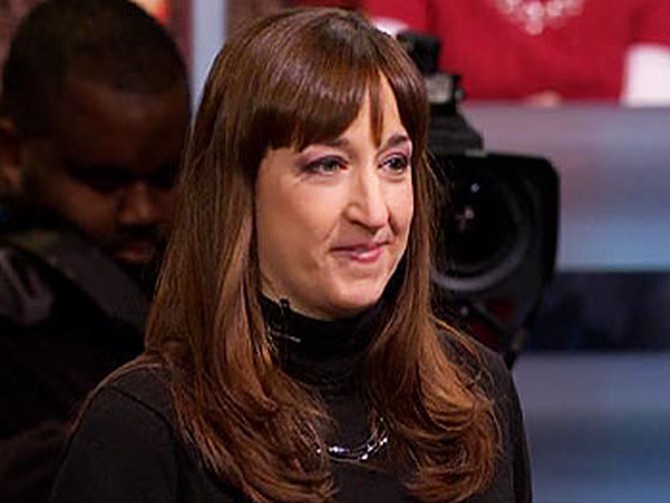
Melissa has a question that brings tears to her eyes. "What happens to our body, to our chemicals, that sends that message to our brain that [says], 'Okay, you're going to cry?'" she says. "I cry all the time… I cannot control it. I am very self-conscious about this."
Crying is normal, Dr. Oz says. In fact, if you've ever started crying when you see someone else cry, that means your mirror neurons were at work. "They're technically called mirror neurons because when you cry, I see that, and I feel your pain, and I want to do something about it," he says. "That cathartic process is hugely beneficial for us."
Hormones also affect how often someone cries—for example, boys and girls both cry regularly until adolescence. "Little girls continue crying about once a week or so. … Little boys, once a month at most, and so we know estrogen is a big part of it," he says. "Prolactin, which is the hormone that you use to make your breasts start to lactate, is also, we think, linked to tears. When you cry, you cry out some of these hormones and some minerals as well."
Crying can also be a symptom of emotional wounds that need to heal. "If there is something deep down inside of you bothering you that you're suppressing, you will obsess [over] it," he says. "It will come back over and over again to come up."
Melissa wants to know why she couldn't cry when she got terrible news. "You can also be so sad you can't cry," Dr. Oz says. "You just go past what's deal-able until your normal system short-circuits."
Crying is normal, Dr. Oz says. In fact, if you've ever started crying when you see someone else cry, that means your mirror neurons were at work. "They're technically called mirror neurons because when you cry, I see that, and I feel your pain, and I want to do something about it," he says. "That cathartic process is hugely beneficial for us."
Hormones also affect how often someone cries—for example, boys and girls both cry regularly until adolescence. "Little girls continue crying about once a week or so. … Little boys, once a month at most, and so we know estrogen is a big part of it," he says. "Prolactin, which is the hormone that you use to make your breasts start to lactate, is also, we think, linked to tears. When you cry, you cry out some of these hormones and some minerals as well."
Crying can also be a symptom of emotional wounds that need to heal. "If there is something deep down inside of you bothering you that you're suppressing, you will obsess [over] it," he says. "It will come back over and over again to come up."
Melissa wants to know why she couldn't cry when she got terrible news. "You can also be so sad you can't cry," Dr. Oz says. "You just go past what's deal-able until your normal system short-circuits."

How did you do with Dr. Oz's first Prescription America assignment? Dr. Oz's second assignment is a little snack before dinner that can make a big impact on your waistline.
For the next 14 days, Dr. Oz wants you to eat one slice of 100 percent whole grain bread lightly dipped in non-chemically processed extra virgin olive oil before every dinner. "[The bread has] B vitamins in it. It has fiber, which we've talked about is important for you," he says. "That's all good because it actually slows the movement of food through your stomach."
The olive oil, Dr. Oz says, is a healthy fat. "Remember, healthy fats are the ones that are liquid at room temperature in general, and olive oil has vitamin E in it," Dr. Oz says. "It's got all these cool little chemicals that work as antioxidants. If you combine them together, you're giving yourself wonderful nutrition to feed the liver."
Dr. Oz says this easy, yet powerful, combination will reduce the amount of food you'll eat at dinner and keep your fuller for longer amounts of time. "Dinner's our big meal where we make most of our mistakes," he says. These mistakes can lead to serious consequences, like heart attack or diabetes. Eating whole wheat bread and olive oil can reduce your risk for both, Dr. Oz says. "And you'll probably lose weight to boot."
More health answers from Dr. Oz, America's Doctor
For the next 14 days, Dr. Oz wants you to eat one slice of 100 percent whole grain bread lightly dipped in non-chemically processed extra virgin olive oil before every dinner. "[The bread has] B vitamins in it. It has fiber, which we've talked about is important for you," he says. "That's all good because it actually slows the movement of food through your stomach."
The olive oil, Dr. Oz says, is a healthy fat. "Remember, healthy fats are the ones that are liquid at room temperature in general, and olive oil has vitamin E in it," Dr. Oz says. "It's got all these cool little chemicals that work as antioxidants. If you combine them together, you're giving yourself wonderful nutrition to feed the liver."
Dr. Oz says this easy, yet powerful, combination will reduce the amount of food you'll eat at dinner and keep your fuller for longer amounts of time. "Dinner's our big meal where we make most of our mistakes," he says. These mistakes can lead to serious consequences, like heart attack or diabetes. Eating whole wheat bread and olive oil can reduce your risk for both, Dr. Oz says. "And you'll probably lose weight to boot."
More health answers from Dr. Oz, America's Doctor
Published 01/01/2006
As a reminder, always consult your doctor for medical advice and treatment before starting any program.

